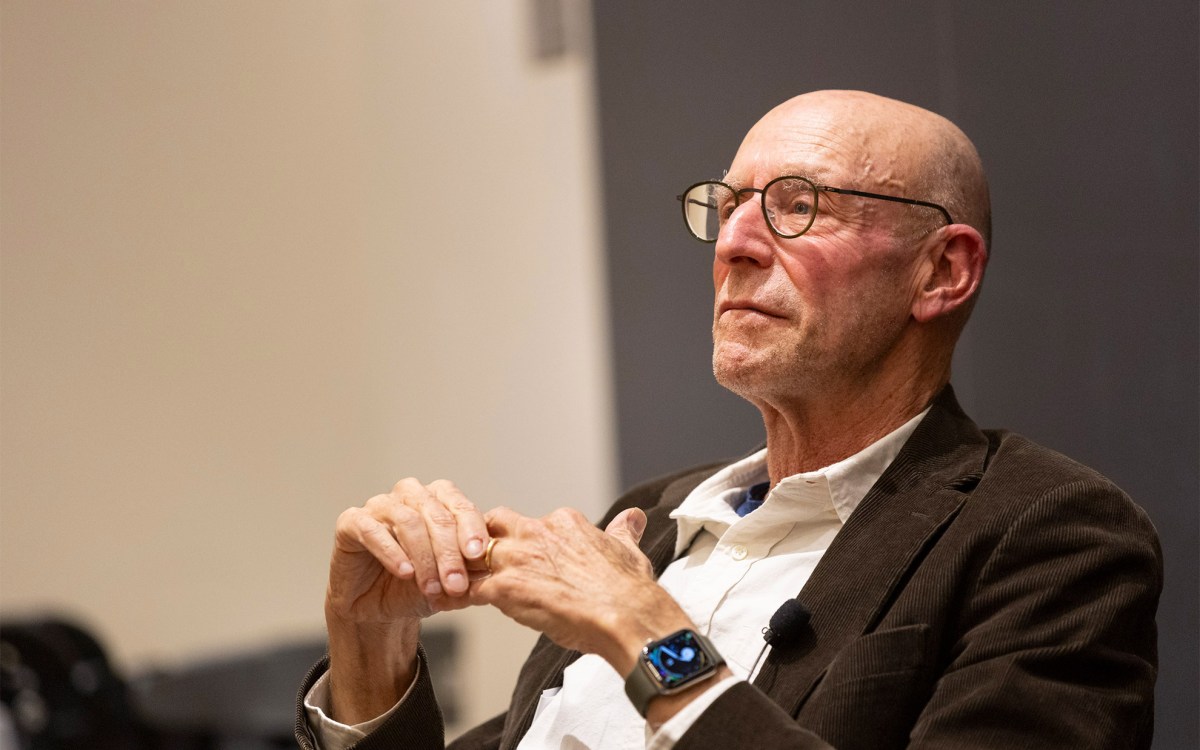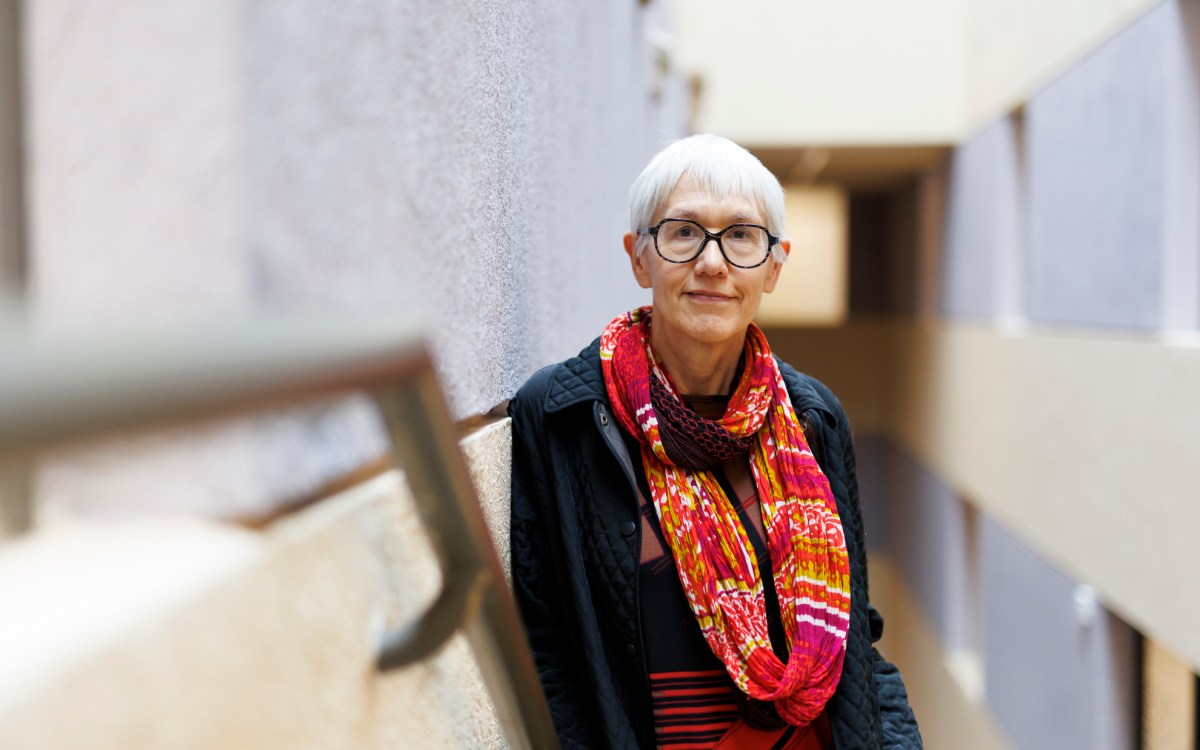Science & Tech
-

What exactly is consciousness? (And does my Venus flytrap have it too?)
In new book, author Michael Pollan explores nonhuman sentience, stream of thought, AI
-

Can a chatbot be a co-author?
Physicists take souped-up ChatGPT out for a spin, return home with significant discovery

-

Preserving learning in the age of AI shortcuts
In podcast, teachers talk about how they’re using technology to supercharge critical thinking rather than replace it
-

A ‘cocktail’ recipe for brain cells
Stem cell biologists discover how to regenerate type damaged in ALS, spinal cord injuries

-

When you do the math, humans still rule
Harvard’s Lauren Williams, a MacArthur ‘genius,’ joins international effort to challenge notions of AI supremacy
-

‘Imagination’
Less like a picture, more like a video game? Cognitive scientist explains how we ‘see’ what isn’t real.
-
Genetic computation tells man from microbe
By one estimate (based on bacteria counts in the colon or stool samples), microbes that call our bodies home outnumber human cells 10 to 1. Most of the bacteria, viruses,…
-
Physicians vs. the Internet
Each day, about 7.5 million people in the United States use the Internet to get health information, while less than 3 million consult their doctors. Of the 110 million Americans…
-
SPH professor finds Taliban inmates dying, in need of care
Jennifer Leaning is a professor in the Harvard School of Public Health’s Department of Population and International Health. She is also one of Physicians for Human Rights’ founders. In January…
-
Chandra scores a double bonus with a distant quasar
In one set of observations of quasar PKS 1127-145, researchers found an X-ray jet that extends over a length of at least a million light years. The jet reveals explosive…
-
Powerful mutagen found in Massachusetts water
Mutagen X, a by-product of chemicals used to disinfect public water supplies, is not monitored or regulated in the U.S. water supply. A new report from researchers at Harvard’s School…
-
Study examines data withholding in academic genetics
Eric G. Campbell, of the Institute for Health Policy at Massachusetts General Hospital and Harvard Medical School, and his colleagues recently surveyed geneticists and other life scientists at the 100…
-
New, far-out planet is discovered
A planet discovered in the constellation Sagittarius is so distant that light takes 5,000 years to travel from there to here at a speed of 186,000 miles per second. Called…
-
Human genome sequence yields new tool for microbe-hunting
Microbiologists have traditionally identified pathogens (disease-causing organisms) by growing them in a laboratory dish from a sample of infected tissue. But not all pathogens can be cultured this way. Molecular…
-
Tuning the system: Program buffers health care collisions
The Health Care Negotiation and Conflict Resolution program at the Harvard School of Public Health, led by Leonard Marcus, trains health care professionals to minimize the conflicts that inevitably arise.…
-
Minority patients face barriers to optimum end-of-life care
Eric Krakauer is an instructor in medicine at Harvard Medical School and part of Massachusetts General Hospital’s Palliative Care Service. He and his colleagues have been concerned that, according to…
-
Submillimeter array opens one of astronomy’s last frontiers
Exploring one of astronomy’s last frontiers at a site near the summit of Mauna Kea in Hawaii, the submillimeter array (SMA) project offers a unique opportunity for astronomers to observe…
-
Structure in dust around Vega may be signature of planet
Vega, located 25 light years away in the constellation Lyra, is the brightest star in the summer sky. Observations of Vega in 1983 with the Infrared Astronomy Satellite provided the…
-
Chandra finds ghosts of eruption in galaxy cluster
Astronomers using NASA’s Chandra X-ray Observatory recently discovered relics of an ancient eruption that tore through a cluster of galaxies. The discovery implies that galaxy clusters are the sites of…
-
Which side are you on?
Andrew Kydd is an assistant professor of government at Harvard University who has developed an interesting theory about mediation. As Kydd writes in the introduction to a working paper, “Mediators…
-
User fees have unintended effect of decreasing health care access for poor
The reform of health care systems is supposed to make access to health care better. But in the particular case of user fees, the opposite effect was observed. During the…
-
Economic growth in Colombia: A reversal of “fortune”?
Between 1950 and 1980, the Colombian economy grew at a respectable average rate of 5 percent. Between 1980 and 2000, that average rate of growth fell to 3 percent. Why?…
-
Grants vs . investment subsidies
In many countries, governments face policy decisions about how to help poor people who have difficulty helping themselves because they can’t borrow money. What is the proper form of intervention?…
-
Indivisible territory and ethnic war
Monica Duffy Toft is assistant professor of public policy at Harvard University’s John F. Kennedy School of Government and assistant director of the Olin Institute for Strategic Studies at Harvard’s…
-
Diagnosis by database shows promise
A relatively new approach to researching cancer involves looking at the actions of thousands of genes in cancer tumors. This technique just recently became possible because, using new applications of…
-
Looking toward the end
Among astronomers there is almost a consensus that universal expansion will go on forever, with galaxies and clusters of galaxies moving away from each other so fast that gravity cannot…
-
Scientists using gene chips identify unique form of leukemia
Currently, physicians diagnose and treat a rare form of cancer that strikes infants as a particularly aggressive form of the more common acute lymphoblastic leukemia. The cancer may respond to…
-
Analysis of potential mad cow risk in U.S. finds little chance of disease spread
The Harvard Center for Risk Analysis (HCRA), part of the Harvard School of Public Health, performed an analysis for the U.S. Department of Agriculture to determine what the effects would…
-
Chandra captures Venus in a whole new light
Researchers using NASA’s Chandra X-ray Observatory have made the first X-ray images of Venus, Earth’s sister planet.
-
Atmosphere detected on distant world orbiting another star
One-hundred-and-fifty light years away from Earth, in the constellation Pegasus, is a star known as HD 209458. Using NASA’s Hubble Space Telescope, a research team was able to detect the…
-
New study provides mixed report card on informed consent to cancer clinical trials
According to a study that appeared in the Nov. 24, 2001, issue of The Lancet, nearly one quarter of cancer patients who participate in clinical trials do not realize that…
-
Survey shows Americans not panicking over anthrax
In the wake of biological terror attacks perpetrated by unknown persons sending anthrax-laced letters through the U.S. mail, the Harvard School of Public Health and the Robert Wood Johnson Foundation…
-
Strong student support found for war
American college students strongly support U.S. war objectives in Afghanistan aimed against the Taliban and Osama bin Laden’s al Qaeda terrorist network, according to a survey conducted by the Institute…
-
Anthrax expert Matthew Meselson speaks out
In 1992-93, Harvard Professor Matthew Meselson investigated the largest known outbreak of inhalation anthrax in history, which occurred in the Soviet Union in 1979. The anthrax was accidentally released from…
-
It’s easy being green
Eleven interns worked on seven projects across Harvard University for three months in the summer of 2001. The internships were sponsored by the Harvard Green Campus Initiative, in collaboration with…
-
Atmospheric chemists fly high and low for novel carbon dioxide measurements
Political leaders throughout the world have taken notice of the increasing levels of carbon in the atmosphere and have begun negotiations on how to mitigate “greenhouse” gases through accords such…


